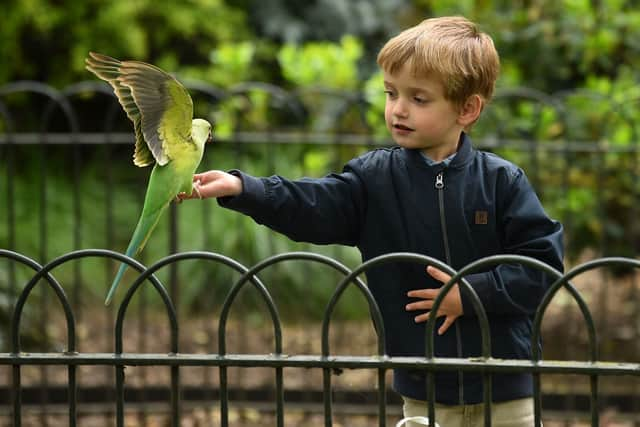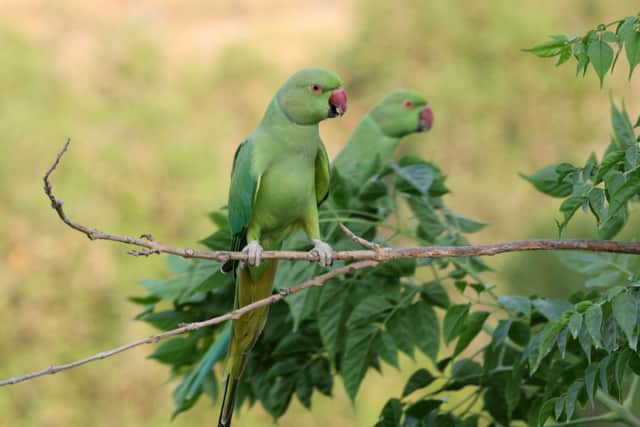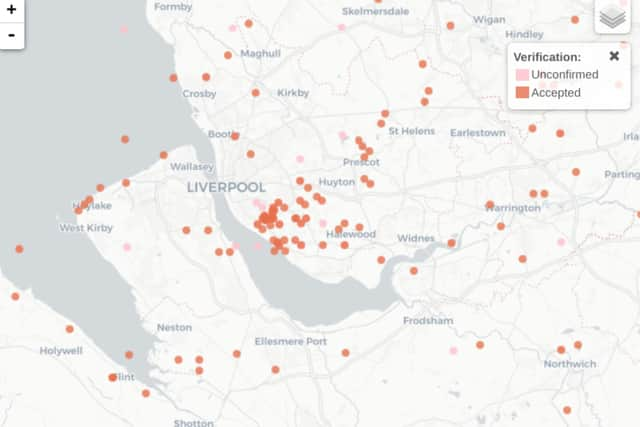Bright green birds settling in Liverpool - why are we seeing more parakeets in local parks?
and live on Freeview channel 276
The UK’s only naturalised bird species can be seen at many of Liverpool’s best parks.
Ring-necked parakeets, began breeding in the south of England in the 1960s, but in recent years, they have been frequently spotted in Merseyside.
Advertisement
Hide AdAdvertisement
Hide AdThe stunning, bright green birds have become a regular sight in Sefton Park, Princes Park, Cressington Park and other areas of Liverpool, and people either love or hate them - with concerns they cause damage to the natural enivronment.
In 2009, parakeets were added to the UK’s list of species which can be culled without individual permission, if damage is being done. In their native countries, they are considerd to be pests, causing damage to crops.
What type of parakeets are being seen?
It is unknown exactly when and how parakeets ended up settling in England, however, researchers at The University of Kent traced the majority of the UK’s parakeets to Pakistan and northern India, with other research pointing to Africa.
Ring-necked or rose-ringed parakeets (Psittacula krameri) are the most common breed found in the UK and they have been spotted in London and South East England since the 1990s. However, it is only recently that there have been frequent sightings of the green birds around the country.
Advertisement
Hide AdAdvertisement
Hide Ad

Monk parakeets did also used to frequent parts of South England, however, they are expected to become by the end of this year, after being humanely captured by DEFRA (Department for Environment, Food and Rural Affairs) since 2011.
Why have parakeets settled in the UK?
Theories surrounding how parkeets became common in the UK include them being released by owners after the parrot boom in the 1930s. Between 1930-1950, parakeets became popular pets, however, after scientists announced owners could catch respiratory diseases from the birds, many were released into the wild.


Other, more exciting theories, include Jimi Hendrix releasing a pair of parakeets in London in the 1960s and parakeets escaping from a film set of The African Queen.
According to the Royal Society for the Protection of Birds (RSPB), parakeets in other parts of England are likely escapees. The RSPB estimates that there are 8,600 breeding pairs in the UK.
Advertisement
Hide AdAdvertisement
Hide AdWhy are they settling in Liverpool?
Parakeets love suburban parks, large gardens, and orchards - and Liverpool has an abundance of beautiful green spaces.
It’s not certain exactly why we’re seeing more of the birds in Liverpool, but the most common explanation is the release of parakeets bought as pets.


Locals are divided on the green birds with many taking to Reddit to discuss their opinions.
The most recent Reddit thread, titled: ‘What are your thoughts on the parakeets in sefton/princes park? Are they charming or invasive bullies? Took this behind the palm house today’ features a picture of a parakeet in Sefton Park, and received multiple responses.
Advertisement
Hide AdAdvertisement
Hide AdOne user said: “I love them! I live not far from Newsham and one appeared in my garden the other day.”
Another user said: “I’m from down south where there are tons of them, never seen any British wildlife destroy trees/plants so quickly. Look great though.”
Although there are concerns that they may have a negative effect on the local ecological system, a user said: “I prefer them to other invasive species to be honest.”
Comment Guidelines
National World encourages reader discussion on our stories. User feedback, insights and back-and-forth exchanges add a rich layer of context to reporting. Please review our Community Guidelines before commenting.
